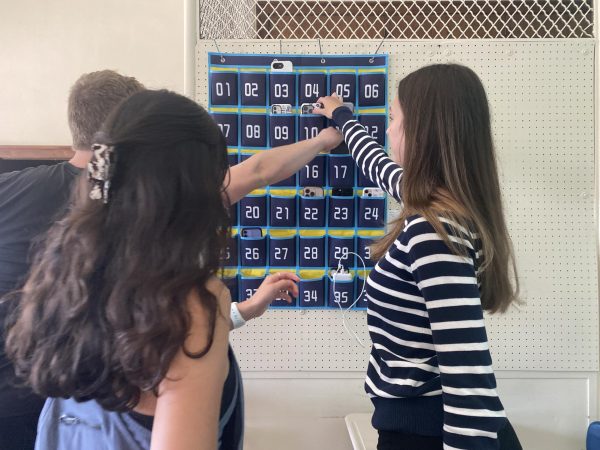The significance of summer assignments
Most English courses assign mandatory summer reading that prepares students for the upcoming school year.
The bell rings as you pack your stuff up after finishing your last final of the year. Exiting out Door O, you are mentally and physically checked out, thankful that schoolwork is over until September.
However, that is not the case, as several courses, including a majority of AP classes, require a summer assignment to be completed before the start of the next school year.
Each year, summer homework is assigned for specific courses within the English, Math, Science, and World Language departments. Before the assignments are released, teachers must meet to decide the content of the following year’s assignment, according to English department head Ms. Vale.
“Each group gets together to discuss what would help their students understand the first unit of the year,” Vale said. “From there, they’ll choose an activity to help them better facilitate that unit.”
According to Mr. Bell, the assistant principal overseeing the Math, Omega and History departments, summer should be a time for relaxation, though he believes that it should also be a time to bridge the learning between school courses taken the previous year and the upcoming year.
“I think that [summer homework] helps to fill the gap in learning if your upcoming math class, for example, is at a higher level than previous classes,” Bell said.
Though she understands the arguments for summer homework, Katie Stamatis, Div. 956, believes that summer would be better served as a time for relaxation.
“The whole point of summer break is to not think about school,” Stamatis said. “It honestly doesn’t help students and it causes unnecessary stress. Also, summer homework can bring down grades right away.”
While summer carries the connotation of being a time for students to relax and catch up on missed sleep, it also creates a setback for learning that causes gaps in knowledge once students return in the fall.
According to The Washington Post writer Andrea Orr, “brain drain” is a phenomenon that can affect children in both the short-term and the long-term.
“Students, on average, lose about two months of progress in reading and math over the summer,” Orr wrote. “If not addressed, the loss can be cumulative, severely affecting progress and the potential for long-term success.”
Harris Cooper, a psychology and neuroscience professor at Duke University, agrees that summer break creates issues with performance at school, arguing that “not only might students have to relearn academic material, they also must acquaint themselves with the language of instruction.”
Vale said that the implementation of summer homework at Lane allows teachers to identify strengths and weaknesses that each individual student possesses, helping them shape their curriculum for the year.
“[The English department] is trying to make a move towards having it be diagnostic in nature so it allows students an opportunity to demonstrate to their teachers what are some of the things that they are bringing to our new classrooms,” Vale said. “This is great because it allows us to skip things that the students already know and go right to the things that they could work on.”
Bell said he understands the importance of summer homework and believes that there must be a purpose behind all assigned homework.
“It should help kids get ready for the next year,” Bell said. “It should never be ‘do it just to do it.’”
Vale said she believes summer assignments should be mandatory since it will help students develop skills and general understanding in the desired subject.
“The assignment shouldn’t be ‘busy work,’” Vale said. “It shouldn’t be a bunch of questions or a task that is not really going to help the students master the work, master the skills.”
The implementation of options to choose from is a recent phenomenon, according to Vale.
While summer homework may seem like a burden for many students, it will help all students succeed in the long run.
“Our students are really smart, and I already know that they come with a wealth of knowledge,” Vale said. “By doing this assignment, they can help us help them better than if they just came to our classroom and we didn’t know anything about them.”
Your donations directly fund the Lane Tech student journalism program—covering essential costs like website hosting and technology not supported by our school or district. Your generosity empowers our student reporters to investigate, write, and publish impactful stories that matter to our school community.
This website is more than a publishing platform—it's an archive, a research tool, and a source of truth. Every dollar helps us preserve and grow this resource so future students can learn from and build on the work being done today.
Thank you for supporting the next generation of journalists at Lane Tech College Prep!

Jackson Janes, a senior at Lane Tech, is heavily involved in school clubs such as Key Club and Influencers for Society, a club which spreads general positivity...




